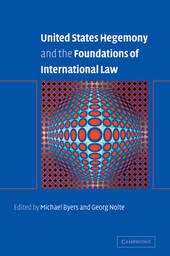
|
United States Hegemony and the Foundations of International Law
Paperback / softback
Main Details
| Title |
United States Hegemony and the Foundations of International Law
|
| Authors and Contributors |
Edited by Michael Byers
|
|
Edited by Georg Nolte
|
| Physical Properties |
| Format:Paperback / softback | | Pages:552 | | Dimensions(mm): Height 228,Width 151 |
|
| ISBN/Barcode |
9780521050869
|
| Classifications | Dewey:341.09 |
|---|
| Audience | | Professional & Vocational | | Tertiary Education (US: College) | |
|---|
| Illustrations |
Worked examples or Exercises
|
|
Publishing Details |
| Publisher |
Cambridge University Press
|
| Imprint |
Cambridge University Press
|
| Publication Date |
21 January 2008 |
| Publication Country |
United Kingdom
|
Description
Successive hegemonic powers have shaped the foundations of international law. This book examines whether the predominance of the United States is leading to foundational change in the international legal system. A range of leading scholars in international law and international relations consider six foundational areas that could be undergoing change, including international community, sovereign equality, the law governing the use of force, and compliance. The authors demonstrate that the effects of US predominance on the foundations of international law are real, but also intensely complex. This complexity is due, in part, to a multitude of actors exercising influential roles. And it is also due to the continued vitality and remaining functionality of the international legal system itself. This system limits the influence of individual states, while stretching and bending in response to the changing geopolitics of our time.
Author Biography
Michael Byers is Associate Professor of Law at Duke University. Georg Nolte is Professor of Law at the University of Goettingen.
Reviews'The range of topics is impressive and the collection will prove invaluable to students of international law and relations.' Contemporary Review '... there is no question that this book is an important work ... this is a well-written, provocative and insightful work that achieves its objective in presenting a variety of viewpoints on the impact of a predominant superpower on the international legal system. It is an essential read for anyone who is interested in the operation of power in international law.' Cambridge Law Journal '... considering the strong emotions awakened by the United States' fight against terrorism and in particular the war on Iraq, the book remains a welcome voice of reason, serving as a reminder of the importance of the bigger historical picture.' German Law Journal 'This book offers a valuable insight into how the international legal system is developed and influenced by a hegemonic power ... there are clear warnings that the United States has the power to act in ways that can undermine the usual international interactions and institutions. These warnings proved very apt after the book was completed, as the United States and the United Kingdom - a new and an old empire - acted contrary to international law and outside the relevant international institutions to institute armed conflict in Iraq. This book puts this action in context. I recommend it very highly.' Robert McCorquodale, University of Nottingham, Leiden Journal of International Law '... this is an extremely thought-provoking and penetrating study and deserves wide reading.' Common Law World Review
|